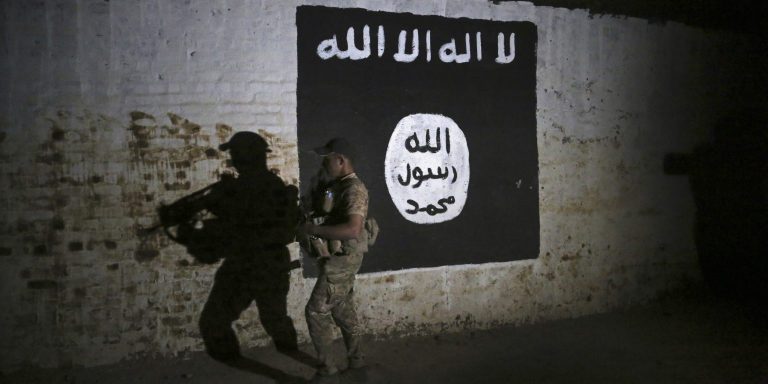INTELBRIEF
July 28, 2020
IntelBrief: Recent Sanctions against the Islamic State: Symbolic or Substantive?

- In mid-July, the Riyadh-based Terrorist Financing Targeting Center (TFTC) announced the designations of entities and individuals linked to the so-called Islamic State.
- The TFTC’s sanctions are more symbolic than substantive since the United States already designated all of the entities and individuals in 2019.
- The United Nations 1267 Sanctions Committee has yet to list any of the individuals and entities subject to the TFTC and U.S. designations.
- As the Islamic State financial threat continues to evolve, it is incumbent that the United States, TFTC, and the United Nations, when politically possible, harmonize terrorism listing proposals to maximize impact.
In mid-July with much fanfare, the U.S. Department of the Treasury announced that it had jointly designated four entities and two individuals, all linked to the so-called Islamic State, under the umbrella of the Terrorist Financing Targeting Center (TFTC). In May 2017, the United States and Saudi Arabia announced the intent to establish the TFTC with the aim to disrupt terrorist financiers, logisticians, and facilitators. Since the TFTC’s formation, the group, which includes Qatar, United Arab Emirates, Bahrain, United States, Oman, Kuwait, and Saudi Arabia, has carried out more than 60 joint terrorist sanctions. Many of those actions, however, were not well synchronized. One major criticism has been that the TFTC is more interested in making press headlines than acting as a serious bulwark to curb the financing of terrorism. Earlier this month, the TFTC announced the designations of the Afghanistan-based Nejaat Social Welfare Organization and its director, Sayeed Khan. As director of Nejaat, Khan has been accused of diverting charitable donations to the Islamic State Khorasan Province (ISKP), an IS affiliate with roots in South Asia. Also, on July 15, TFTC sanctioned three money service businesses based in Turkey and Syria, Al-Haram Exchange, Tawasul Company, and Al-Khalidi Exchange. According to the Treasury press release noting the TFTC joint action, the three money service businesses played important roles in providing hundreds of thousands of dollars to IS leadership. Finally, TFTC also designated Abd-al-Rahman, a key IS facilitator who ensured the flow of funds between Turkey and Syria. Turkey serves as a key logistical hub for Islamic State and Islamic State-affiliated individuals and cells, due in part to its geography and infrastructure, including links to the licit financial sector and other trappings of globalization, from transportation to communications.
Long prior to the TFTC’s joint announcement, the U.S. Treasury Department had unilaterally sanctioned all the individuals and entities subject to the July 2020 action. In April 2019, Treasury sanctioned Abd-al-Rahman as a ‘Specially Designated Global Terrorist’ under Executive Order (E.O.) 13224. In September 2019, the Treasury designated Al-Haram and Al-Khalidi Exchanges pursuant to E.O. 13224. Finally, in November 2019, the U.S. Treasury designated the Tawasul Company, Nejaat, and Director Khan pursuant to E.O. 13224. As a consequence of the Treasury’s earlier actions, all of the individuals and entities sanctioned by the TFTC were already blocked from, at least in theory, transacting in U.S. dollars. The TFTC action, undoubtedly, would have been more effective and meaningful if announced at the same time as the U.S. 2019 set of announcements. The delay in the Gulf countries taking action could be attributable to several factors, including the U.S. desire to time some of its unilateral sanctions to coincide with multilateral meetings like that of the Counter ISIS Finance Group (CIFG). In November 2019, the United States designated Nejaat, Khan, and Tawasul while the CIFG was convened. Another reason for the possible delay is that coordination between the Gulf countries is complicated by geopolitics, articularly the intransigence of the Saudi-led blockade against Qatar. It is also plausible that the United States was simply unable to quickly provide the requisite information that the Gulf states deemed necessary before sanctioning the six entities and individuals based on their own respective domestic legal authorities.
Whatever the reason, the staging of these sanctions and many others previously announced by the TFTC serve to magnify the difficulties, or ambivalence, in synchronizing multi-nation sanctions – even against an organization as odious as the Islamic State. The premier international sanctions regime administered by the United Nations 1267 Sanctions Committee has yet to add Nejaat, Khan, al-Rahman, Tawasul, or the al-Khalidi and al-Haram exchanges, despite the fact that the U.S. Treasury has stated the key role each actor has played in financing IS or its affiliate, ISKP. The impact of listing these entities pursuant to the UN 1267 Consolidated List would be far more significant than the narrowly enforced TFTC sanction because it would obligate more than 190 countries to implement an assets freeze, travel ban, and arms embargo against them.
While proposed listings at the UN 1267 have faced political opposition in the past—even at times those related to the Islamic State—the global nature of the threat posed by IS and its affiliates requires countries to put aside petty political platitudes. While it remains the extent to which politics has hampered these IS-related TFTC and U.S. designations, the international community should aggressively list IS-linked operatives and financiers. While a preponderance of the information in the U.S. Treasury’s press release noting the TFTC listings are stale, going back mostly to activities from 2016 and 2017 and thus reflective of old conduits of ISIS finance, there remains an abundance IS-linked financial actors that should be sanctioned by the UN. With the loss of territory and the attendant lack of access to natural resources, like oil, and an unchecked ability to extort a captive populace, IS access to new streams of revenue is fundamental to the group’s future success. To best counter these efforts, the United States, TFTC, and the UN should redouble efforts to synchronize sanctions and ensure that terrorism designations focus on the most relevant IS and IS-affiliated individuals and entities.
.
For tailored research and analysis, please contact: info@thesoufancenter.org